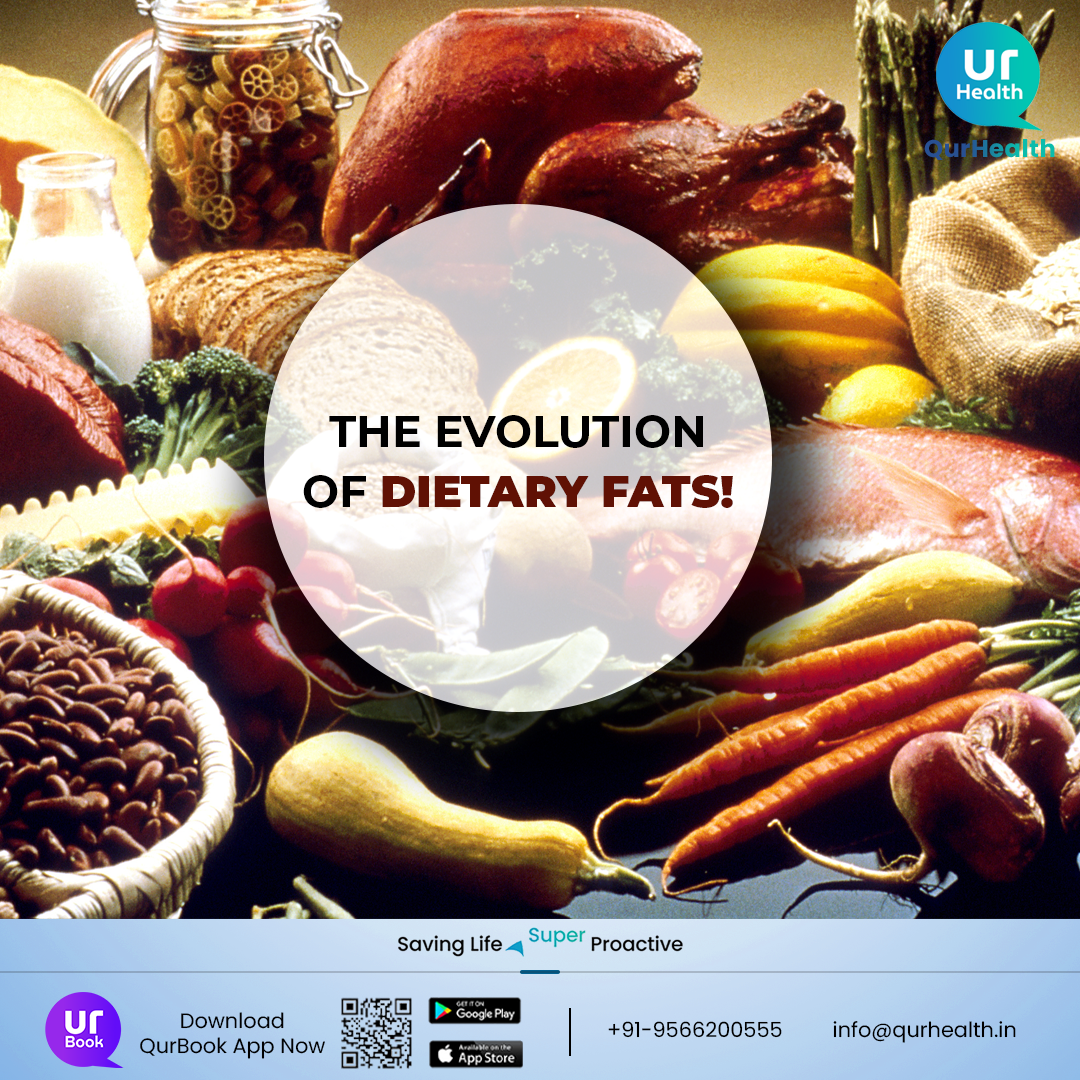
Contact Us: +91 9566200555 info@qurhealth.in
Download Qurbook today to explore health benefits offered by QurBook for your well-being.
The evolution of dietary fats!
In today’s health-focused world, many people try to avoid dietary fats, thinking they are bad for a healthy lifestyle. But fats are more than just something to avoid—they are quite important, and understanding their role in our diet is key to staying healthy.
Like other nutrients, fats play a big part in keeping us well. They give us energy, help our cells work properly, and even protect our organs. Even though fats sometimes get a bad reputation, they are essential for good health when eaten in the right amounts and from the right sources.
Let’s dive into why fats are important and how they can boost your well-being. Here is a closer look at fats and their significant role in a balanced diet:
Classifications of Fats
We can classify fats into three categories:
- Saturated fats, often considered unhealthy, can elevate LDL (Bad Cholesterol) in our body, potentially triggering various health ailments. Common sources include processed foods and red meats.
- Trans fats, also deemed unhealthy, are linked to cardiac ailments, diabetes, hormonal imbalances, and other issues. Margarine, lard, red meat, and processed foods are significant sources of this type of fat.
- Unsaturated Fats known as healthy fats, help maintain heart health. Olive oil, rice bran oil, ghee, and nuts are good sources of these fats.
You Need Fats in Your Diet
Yes, you read that right! Fats are essentially required to ensure optimum health, when taken in moderation, dietary fats come up with many nutritional interests. They give energy and prop up cell functions. Fats also help safeguard our organs, keep our bodies warm, and fabricate some essential hormones. It also mobilizes the joints.
If your diet is coming up with the right kind of fats, it can promote a healthy heart by the downswing of inflammation, bad cholesterol, and blood pressure.
Role of Fats on Absorption & Cholesterol Management
How many of you take vitamin supplements? It’s very common to hear about Vitamin Supplements, you will be surprised to know that an adequate amount of fats are crucial for fat-soluble vitamins; Vit-A, D, E & K. These vitamins are fat soluble, and they only get absorbed in your body if you are having enough fats through your diet.
Do you know dietary fats and cholesterol levels go hand in hand, there are also classifications of cholesterol, like HDL, LDL, VLDL, etc. As we have previously discussed unsaturated fats like MUFA & PUFA elevate the good cholesterol (HDL). So, if your lipid profile is showing you are deficient in HDL cholesterol, then you must pick healthy fats like omega 3 fatty acids, and omega 6 fatty acids. You can decorate your diet with nuts, seeds, fish, cold-pressed oil, almonds & cashews. HDL cholesterol keeps your heart active and very healthy.
Role of Fats on Brain Health & Hormonal Balance
Do you know that good fats are not only essential for optimum heart health but also it has importance for our brain health? Yes, particularly omega-3 fatty acids, are mandatory for brain health and its cognitive functions. They put up to the structure of cell membranes and support neurotransmitter functions which are essential for memory function as well as learning capabilities.
Are you experiencing any hormonal imbalance despite eating a healthy meal that is very low in fats? We often come across this situation where we feel our diet is great, but still, why am I having a hormonal imbalance, why am I not losing more weight as expected? It can be due to over-restriction on dietary fats.
It is very interesting to know that Fats are required to yield hormones, which can operate metabolism and inflammation.
Now, we know the benefits of fats, but they will be visible only if we take them in moderation by following the dietary allowance limit. Fat is the most calorie-dense nutrient, hence overeating can be a risk to your health.
Let us know some tips to judge your fats and how you can only take the benefits out of this nutrient:
- Pick the correct sources of good fats. You can go for nuts, seeds, fish, avocado, and ghee.
- It is best to use cold-pressed oil for retaining nutrients.
- Have enough fiber to get extra control over visceral fats.
- Include soaked dry fruits in your diet for an extra boost.
- Rotate your cooking oils regularly.
- Avoid repeatedly using oil for frying.
- Start your day with a teaspoon of ghee in lukewarm water to promote good cholesterol.
- Keep an eye on your lipid profile to track your cholesterol levels.
References:


